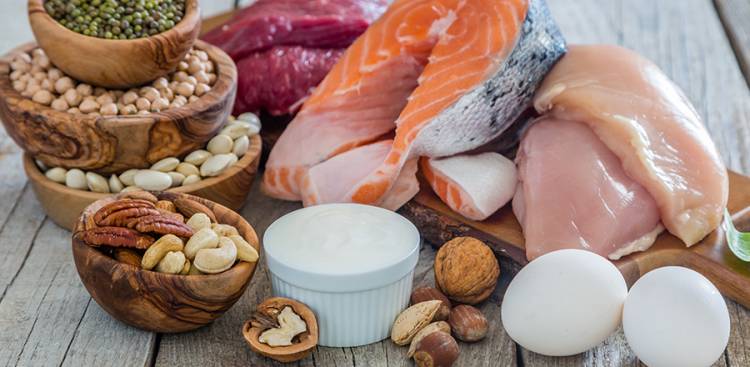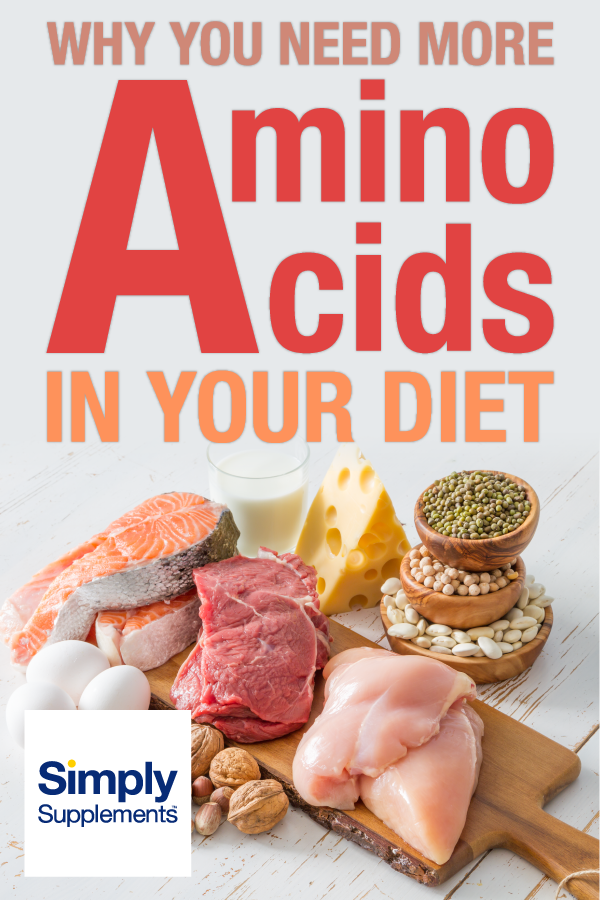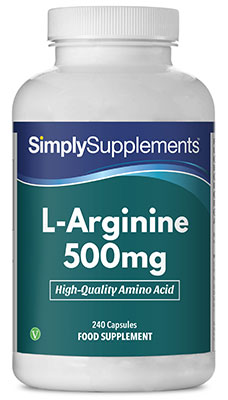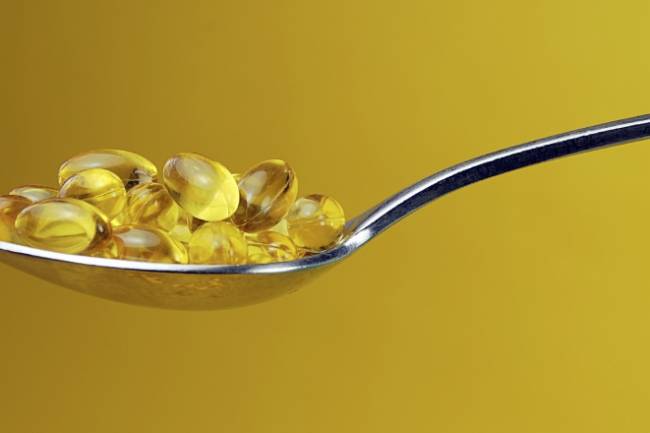The Importance of Amino Acids

It is difficult to underestimate the importance of amino acids in the diet, as they're so intimately involved in almost every process of the body.
In this article we'll take a look at some of the most important of these roles, helping you understand in more detail the need to consume a balanced diet rich in amino acid sources.
What are Amino Acids?
Nutritionists often talk about “macronutrients” - sometimes shortened simply to the phrase “macros”. These are the carbohydrates, the fats and - of most relevance here – proteins found in your diet.
The fact is that protein itself is constructed from smaller molecules - and these are the amino acids.
At present, scientists recognize 20 different amino acids in the human body, which are divided into those considered to be “essential” because the body can't produce them, and “non-essential” amino acids which can be created by the body.
There are nine essential amino acids in humans. These are known as:
- Lysine
- Tryptophan
- Methionine
- Phenylalanine
- Threonine
- Histidine
- Valine
- Leucine
- Isoleucine
These last three - Valine, Leucine and Isoleucine - are sometimes grouped together as “Branched Chain Amino Acids” or “BCAAs” on account of their structure and can be popular among sportspersons looking for rapid recovery from the rigors of exercise.
Why Do We Need Amino Acids?
 As any school child will tell you, protein is crucial for normal growth and development.
As any school child will tell you, protein is crucial for normal growth and development.
Protein - and the amino acids they are made from - play a crucial role in the structure of everything from muscle, ligaments and skin through to your hair and nails. In other words, amino acids are crucial for life.
What you might not also realize is all the other ways in which amino acids are important. Here are just a few of the bigger roles that amino acids play in the body:
Blood Sugar Control
The way in which your body responds to the glucose we consume is crucial; it's how we access and utilize the calories contained in our food. At its most basic level insulin is released from the pancreas in response to food. Insulin - a hormone - then signals to other cells in the body to absorb glucose from the bloodstream. Issues with this system can lead to the symptoms we know as diabetes, which can have serious consequences if not managed correctly.
Scientists have discovered that the consumption of amino-acid-containing protein plays a key role in this regard. Eating protein triggers insulin levels to rise, encouraging the body to respond appropriately to the glucose in our food and to absorb it into cells where it can be used for energy.
Immune Function
The white blood cells circulating around our body are a key tool in the fight against infection. Here the amino acids in your body play a number of important roles. Firstly, of course, they help to provide the energy needed to mount an attack.
Just as importantly, however, they are also believed to play a crucial role in allowing white blood cells to multiply to the levels necessary to fight off infection. Indeed, studies have shown that restricting the free amino acids in the body - especially the branched chain amino acids – can impair the immune system and increase the incidence of infection.
Hormone Production
Hormones can be thought of as signaling molecules, encouraging the body to respond to a stimulus. Hormones can raise our blood pressure during exercise, encourage us to sweat when we're hot and a whole lot more. Amino acids are also important here as they either serve as the basis for creating specific hormones, or encourage these hormones to be released.
As an example, there is evidence that the amino acids lysine and arginine help to trigger the release of growth hormone. As the name suggests, this hormone encourages the growth and development of cells, which can be particularly useful for developing children and sports people looking to increase muscle mass.
What Do the Essential Amino Acids Do?
Now that we have investigated some of the biggest impacts that amino acids have on the body, let's take a closer look at the essential amino acids - those you must consume through your diet or in supplement form - to look at some of the key functions of each.
Lysine
 Lysine has a number of important roles in the body. For example, alongside vitamin D it is responsible for the absorption of calcium from the diet, helping to support strong bones and teeth.
Lysine has a number of important roles in the body. For example, alongside vitamin D it is responsible for the absorption of calcium from the diet, helping to support strong bones and teeth.
Evidence also suggests that lysine in the body can affect our behavior. A study in Japan provided a group of women with 2.64g of lysine per day for a period of seven days, with behavioral studies being carried out before and after treatment.
The results demonstrated that the participants experienced a clinically significant reduction in feelings of anxiety, and that the levels of hormones associated with stress also fell. A deficiency, it would seem, can do the opposite and contribute to negative feelings.
Tryptophan
Like lysine, there is mounting evidence that tryptophan impacts a range of behavioral elements. For example, it is known that tryptophan is converted into a substance known as 5-HTP in the body, which is a precursor of the neurotransmitter serotonin.
Tryptophan is also utilized in the creation of melatonin - often known as the “sleep hormone”. The impact of tryptophan on our bodies cannot be underestimated. In one study, volunteers suffering from insomnia were provided with a tryptophan supplement before bed for ten consecutive nights. When compared with a placebo treatment it was found that these individuals enjoyed higher sleep duration and consequently felt more refreshed in the morning.
Similar experiments in children suffering from night terrors have also demonstrated positive impacts from tryptophan use. However, it's not just sleep that can be affected by tryptophan; the impact it has on neurotransmission within the brain may also have an impact on cases of depression. One study found that bipolar patients supplemented with this particular amino acid experienced fewer relapses in their condition, while elsewhere women deliberately fed a tryptophan-deficient diet experienced a clinically-relevant increase in depressive symptoms.
Lastly, it is interesting to highlight that studies have suggested low calorie diets may reduce tryptophan levels within the body, leading to the potential of psychological changes. It has been proposed that this may help to explain some of the difficulties experienced by individuals trying to lose weight, when their reduced food intake may lead inadvertently to a lower mood.
Methionine
Methionine has an astonishingly wide range of effects on the body. For example, scientists have demonstrated that methionine plays a crucial role in the growth of blood vessels, and equally that a deficiency can lead to the greying of the hair associated with natural ageing.
Perhaps most interestingly, however, methionine seems to have a beneficial impact on helping the body to deal with toxins. A methionine supplement, for example, has been used successfully to reverse the negative impacts of copper poisoning and issues associated with an overdose of paracetamol.
Phenylalanine
Phenylalanine is sometimes referred to as the “feel good amino acid” because it is converted into molecules that transmit messages around the body. These include adrenaline, noradrenaline and dopamine, which is the neurotransmitter that activates the pleasure-center of the brain. Indeed, some illegal drugs work, at least in part, by boosting levels of dopamine, leading to feelings of goodwill.
Interestingly, a lack of these neurotransmitters is associated with a range of unpleasant health conditions including ADHD, restless leg syndrome, schizophrenia and Parkinson's disease. This really helps to underline just how much of an impact phenylalanine and its derivatives can have in the body.
Threonine
Threonine is known to play a structural role in the connective tissues of the body, but just as importantly it is also a precursor to two molecules responsible for the transmission of nerve impulses around the body. Threonine can be converted in the body into a substance known as “glycine”, which blocks the transmission of nerve impulses, meaning it can be beneficial for conditions associated with muscle spasms.
However, at the same time it can also be turned into a substance called “serine” which has the opposite effect. Getting enough threonine therefore provides your body with the ability to up- or down-regulate these transmissions as required.
Histidine
 As its name suggests, histidine is a precursor to histamine. Anyone suffering from hay fever or other allergies may have found themselves being prescribed with antihistamines, because it is histamine that helps to trigger an inflammatory response.
As its name suggests, histidine is a precursor to histamine. Anyone suffering from hay fever or other allergies may have found themselves being prescribed with antihistamines, because it is histamine that helps to trigger an inflammatory response.
While this substance may prove frustrating for some individuals in pollen season, it is also a crucial part of the immune system, ensuring the white blood cells are capable of dealing with infection.
Evidence also suggests that histidine plays a role in the healthy creation of red blood cells. These red blood cells, in turn, carry nutrients around the body, ensuring that your cells have the resources they need to function efficiently.
In experiments where histidine deficiency has been studied, participants are found to rapidly lose weight and develop skin lesions. When the deficiency was removed, these unfortunate symptoms rapidly also cleared up.
The Branched Chain Amino Acids
The three branched chain amino acids (BCAAs) have become a popular workout supplement in recent years, particularly among those individuals seeking superior muscle growth and recovery from the damage caused through exercise. Alongside these claims, however, valine, leucine and isoleucine are also thought to have a number of other roles in the body...
Valine
Valine serves as a major element in hemoglobin molecules and is also closely associated with the body's response to insulin.
Leucine
It is known that leucine consumed in the diet is transformed into a substance known as acetyl coenzyme A, an important part of the breakdown of carbohydrates and fatty acids in the body. As a result, it is fair to say that leucine is a crucial part of the complex system that transforms the food we eat into ATP - the energy source used by all our cells.
Isoleucine
Isoleucine, the last amino acid to be considered here, is intimately involved in the formation of red blood cells, and the control of blood sugar in response to food.
Conclusion
From muscle growth to the transmission of electrical signals around the body, from the creation of hormones to the control of glucose in the blood, it is clear that amino acids are a fascinating and important group of nutrients.
Indeed, they impact such a diverse range of different processes that it would not be an exaggeration to say that getting enough amino acids, in the right proportions, is crucial to our very survival. So how important are amino acids?
About as important as it's possible to be, it would seem.

Sources:
https://dm5migu4zj3pb.cloudfront.net/manuscripts/105000/105456/JCI66105456.pdf
https://academic.oup.com/jn/article/136/1/288S/4664141
https://www.tandfonline.com/doi/abs/10.1185/03007998109114287
https://www.jstage.jst.go.jp/article/biomedres/28/2/28_2_85/_article/-char/ja/
https://www.sciencedirect.com/science/article/pii/S0140673670920155
https://www.sciencedirect.com/science/article/pii/0165032785900461
https://www.sciencedirect.com/science/article/pii/S0140673696070444
https://www.cambridge.org/core/journals/psychological-medicine/article/dieting-reduces-plasma-tryptophan-and-alters-brain-5ht-function-in-women/65D9793B88B3301807C47F0EAE69EEA4
http://www.tandfonline.com/doi/abs/10.1081/CLT-100102433
https://www.cabdirect.org/cabdirect/abstract/19441402431
https://www.jci.org/articles/view/108016

 Nicole
Nicole 

























